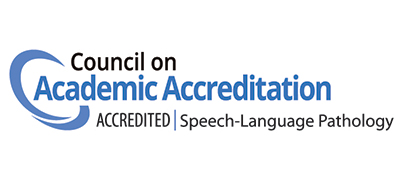Emerson College’s on-campus graduate Communication Disorders MS program features a 54-credit curriculum, with the option to add up to 18 credits of foundational coursework. Housed in the School of Communication, the program is designed with each student’s unique prior experience in mind. Whether you have an undergraduate background in Communication Sciences and Disorders or have no prior experience in the field, we will work with you to tailor your curriculum based on your academic needs.
Courses
Our Communication Disorders MS program can be completed full-time in two years. For full course information, review our course catalog.
The curriculum is a combination of:
- 18 credits of foundational coursework
- 54 credits of applied coursework
- 45 credits of academic coursework
- 4 credits of clinical methods
- 5 credits of practicum
Foundational Courses
We require completion of the following undergraduate courses (within 5 years) before starting the 54 credits of applied coursework.
- Courses can be completed as part of your bachelor’s degree or at any institution (online or in-person).
- Courses must be approved with a grade of B- or better (effective for students applying to the Fall 2025 term).
- You are not required to complete these courses by the time you apply, but they must be completed by the time the applied coursework for the program begins in the fall.
- Emerson offers all foundational coursework for admitted students in the summer in an online, accelerated format:
- Students who enroll in at least 2 foundational courses through Emerson will be able to apply their Federal Financial Aid package to their foundational coursework.
Foundational Courses
| Course Code | Title | Description | Credits |
|---|---|---|---|
| CD 625 | Structures and Functions for Speech, Hearing, and Swallowing | Covers anatomy and physiology of the speech, language, swallowing, and hearing mechanisms | 3 |
| CD 626 | Language Development | Covers language development from birth to adulthood | 3 |
| CD 627 | Survey of Communication Disorders Across the Lifespan | Introduces students to the broad range of speech, language, hearing disorders across the lifespan | 3 |
| CD 629 | Speech Sounds: Phonetics and Acoustics | Combines phonetics and speech science | 3 |
| CD 630 | Foundations of Audiology | An introductory course in audiological assessment and disorders of hearing | 3 |
Accreditation
Accreditation
The Master of Science (M.S.) education program in speech-language pathology (residential and distance education) at Emerson College is accredited by the Council on Academic Accreditation in Audiology and Speech-Language Pathology of the American Speech-Language-Hearing Association, 2200 Research Boulevard, #310, Rockville, MD 20850, 800-498-2071 or 301-296-5700.
Any concerns specific to the program's accreditation status should first be addressed to the program and Emerson College and then to the CAA.
Students who wish to have classroom-related course concerns addressed are expected to follow the Informal Grievance Process.

Last updated November 6, 2023.
American Speech-Language-Hearing Association (ASHA) Certification
Upon completion of the program and passing the national Praxis exam, students are qualified to begin a Clinical Fellowship, which leads to obtaining a Certificate of Clinical Competence (CCC) from ASHA.
The following information is provided in good faith to applicants as of August 24, 2020.
Massachusetts License in Speech-language Pathology
The residential Speech Language Pathology program leads to a Master of Science in Communication Disorders. The designed outcome is to lead applicants to begin their clinical fellowship, the first step to eligibility as a Licensed Speech Language Pathologist within Massachusetts.
Massachusetts Educator License
Applicants who wish to practice in a school setting must coordinate their licensure and approval efforts with the state or local department of education, should requirements differ.
The list below provides information about comparable clinical licenses, including a determination of eligibility for licensure by State. This information provided is designed as a baseline determination of whether the program meets individual state-specific requirements. Other licenses, including those for working in a school system, may be more applicable and/or require additional standards. Licensure requirements and appropriate pathways are subject to change and may differ based on individual student backgrounds, including coursework taken outside the scope of the program. Students should do their own due diligence and determine the appropriate pathway and license type for themselves.
The Emerson College residential Communication Sciences and Disorders program meets the educational requirements for licensure to practice in all states EXCEPT:
- Illinois
- Kentucky
- North Carolina
- Oklahoma
- Tennessee
All graduate students are encouraged to obtain the Massachusetts educator license, which is honored reciprocally in many states, often without requiring additional coursework. To qualify for the initial license, students must have a school practicum placement; must pass the Massachusetts Tests for Educator Licensure (MTEL), Communication and Literacy Skills Test section; and apply for the license.
